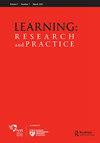Strategies to engage students in learning, minimise educational inequality and improve teacher professionalism
Q2 Social Sciences
引用次数: 0
Abstract
In this issue, there is a focus on three aspects – educational equality, engaging students in the classroom and improving teachers’ professional knowledge, which are necessary to enhance students’ learning performance. As teachers build their professionalism through teaching and attending professional development courses, educational researchers should therefore aim to discover the needs of teachers and design quality teacher professional development using effective strategies to help them in building professional competencies. Additionally, the students’ role in building a learning environment tends to be less prominent and passive, as students tend to receive teachers’ teaching and are “shaped” by the educational system (Könings et al., 2014), showing less engagement in learning. However, students’ learning attitude and behaviours also determine the learning outcome. Therefore, the cooperation between teachers and students is essential to enhance students’ learning. The articles in this issue suggest various strategies to promote students’ engagement, improve teacher professionalism, and reduce educational equality, for enhancing students’ learning. The first article in this issue by Serrano and Danya (2022) illustrates the relationship between students’ overuse of mobile devices and students’ procrastination in academic activities and how mindfulness can serve as a mediating variable between students’ usage of mobile devices and students’ academic performance. This research article proposes that overuse of mobile devices and apps leads to the academic procrastination. Students intentionally delay doing academic-related activities regardless of serious consequences, due to using their mobile devices. The delay of doing academic work has a huge relationship with declined academic performance. Since the procrastination in schoolwork is due to the excessive attention to mobile devices, mindfulness is introduced to divert the attention from mobiles to academic work. The current research involves 233 psychology undergraduate students. The students self-reported their habits on mobile usage, mindful attention, and procrastination on schoolwork. As expected, the problematic social media usage has a significant positive relationship with academic procrastination. Interestingly, the problematic social media usage has no relationship with academic performance. However, mindfulness does have a mediative role between the problematic social media usage and academic procrastination. The current research points out that mindfulness may be useful to reduce students’ procrastination in schoolwork and educators should consider implementing mindfulness education in the curriculum to reduce students’ use of mobile devices and minimize students’ procrastination in academic work. Teachers’ guidance is a pillar for students to gain sufficient knowledge in classrooms. Therefore, various teaching modes are developed to maximize the knowledge students can gain. For instance, hands-on learning is essential in science education. Hands-on learning and teaching were stemmed from constructivism. The constructivism argues LEARNING: RESEARCH AND PRACTICE 2022, VOL. 8, NO. 2, 79–83 https://doi.org/10.1080/23735082.2022.2110364使学生参与学习、尽量减少教育不平等和提高教师专业水平的策略
在这个问题上,重点关注三个方面——教育公平、学生参与课堂和提高教师的专业知识,这是提高学生学习成绩所必需的。由于教师通过教学和参加专业发展课程来建立他们的专业素养,因此教育研究者应该致力于发现教师的需求,并使用有效的策略来设计高质量的教师专业发展,帮助他们建立专业能力。此外,学生在构建学习环境中的作用往往不那么突出和被动,因为学生倾向于接受教师的教学,并被教育系统“塑造”(Könings et al., 2014),表现出较少的学习参与度。然而,学生的学习态度和行为也决定了学习的结果。因此,师生之间的合作对于提高学生的学习是必不可少的。这期文章提出了各种策略,以促进学生的参与,提高教师的专业精神,减少教育公平,以促进学生的学习。Serrano和Danya(2022)在本期的第一篇文章中阐述了学生过度使用移动设备与学生在学术活动中的拖延症之间的关系,以及正念如何作为学生使用移动设备与学生学习成绩之间的中介变量。这篇研究文章提出过度使用移动设备和应用程序导致学习拖延。由于使用移动设备,学生不顾严重后果,故意拖延与学业相关的活动。学习工作的拖延与学习成绩的下降有着巨大的关系。由于学习上的拖延是由于对移动设备的过度关注,所以引入正念将注意力从手机转移到学习上。目前的研究涉及233名心理学本科生。学生们自我报告了他们在手机使用、注意力集中和学业拖延方面的习惯。正如预期的那样,有问题的社交媒体使用与学业拖延有显著的正相关。有趣的是,有问题的社交媒体使用与学习成绩没有关系。然而,正念确实在有问题的社交媒体使用和学习拖延之间起着中介作用。目前的研究指出,正念可能有助于减少学生的学业拖延,教育工作者应考虑在课程中实施正念教育,以减少学生对移动设备的使用,最大限度地减少学生在学业上的拖延。教师的指导是学生在课堂上获得足够知识的支柱。因此,开发了各种教学模式,以最大限度地提高学生获得的知识。例如,实践学习在科学教育中是必不可少的。实践教学源于建构主义。建构主义论证学习:研究与实践,2022年,第8卷第1期。2,79 - 83 https://doi.org/10.1080/23735082.2022.2110364
本文章由计算机程序翻译,如有差异,请以英文原文为准。
求助全文
约1分钟内获得全文
求助全文

 求助内容:
求助内容: 应助结果提醒方式:
应助结果提醒方式:


